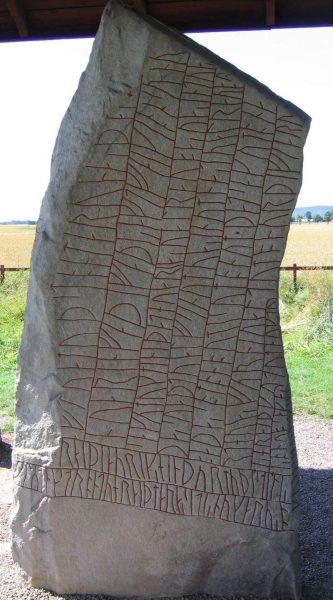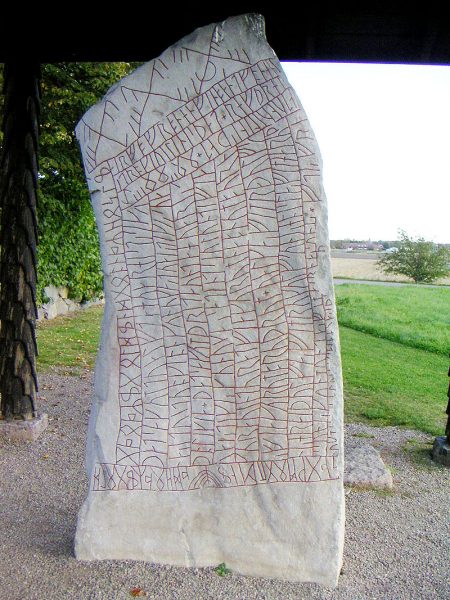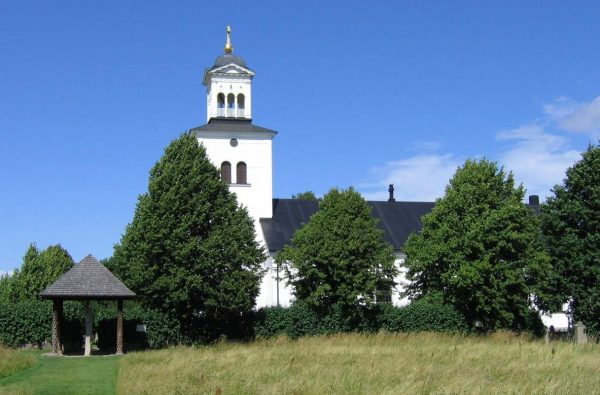Did Vikings Describe Climate Disaster? Viking Runes Gets New Interpretation
Climate disaster seems like the dominant story in just about every news cycle these days.
Teenagers worry about it; teachers inform students about it, and governments that don’t put climate action at the top of their agendas are likely to be ejected from office in the next voting cycle.
There’s no doubt that, if climate worry was the “theme” of the 2010 decade, 2020 is now becoming known as the decade of climate action.
But is it possible that even ancient cultures knew that the warming of the planet was potentially calamitous to mankind? According to a from the University of Gothenburg in Sweden, an ancient stone tablet tried to describe just that — impending peril because of drastic changes in weather.

The Rok runestone, an ancient stone tablet in Sweden inscribed with many lines, has been the subject of intense scientific and historical scrutiny for more than a century.
In the past, scholars have said its images depict huge battles in Norse history. But the stone’s precise meaning changed depending on the times, and the team studying it.
A new investigation, done by a variety of experts from different disciplines, now theorizes that the Rok runestone actually tells of climate disaster that occurred in Sweden many centuries ago.
Their findings have been published in Futhark: International Journal of Runic Studies.

The monument consists of nine riddles. Whomever examines it interprets the symbols through the lens of their discipline, which in this case meant archaeology, science and history all played a part.
These leading researchers say that although past examinations of the runestone suggested the Vikings were describing glorious battles, they now believe the Vikings were describing climate disaster, including ruined crops, mass starvation and other dreadful episodes.
Per Holmberg is a professor at the university and leader of the study. He said, in a preface to the findings, that bringing researchers together from different areas was vital.
“The key to unlocking the inscriptions,” he explained, “was the interdisciplinary approach… without these collaborations, it would have been impossible to solve the riddles of the Rok runestone.”
The answers, he continued, to five of the riddles posed is “the sun,” while the remaining four are about Odin, a Norse god, and his armies.
Bo Graslund is co-author of the new study and a professor of archaeology at Uppsala University.
In a statement released in January, he said, “Before the Ruk runestone was erected, (in 800 CE) a number of events occurred that must have seemed extremely ominous: a powerful solar storm coloured the sky in dramatic shades of red; crop yields suffered from an extremely cold summer, and later, a solar eclipse occurred just after sunrise.”

Because the Vikings did not have the same scientific understanding of these events that we do today, Graslund continued, these would have been interpreted as harbingers of doom.
“Even one of these events would have been enough to raise fears of another Fimbulwinter.” A Fimbulwinter, he explained, refers to a long, bitterly cold winter.
The team was thrilled, they said, to view this crucial Viking monument in an entirely new way. One of them, Henrik Williams, is a professor of Scandinavian linguistics, with a speciality in Runology, at Uppsala.
He said in the preface that the new interpretation has profound implications for the study of Norse mythology and history. “For me,” he said, “It’s been almost like discovering a new literary source from the Viking Age.”
The scholars’ work has shed a whole new light on one of Sweden’s most important relics from the Viking era.
Now, experts understand that they were fighting an entirely different kind of battle — one of man against weather, light against darkness, and heat against cold, all of which determined the Vikings very survival.
Over Hunting, is That Why The Vikings Abandon Greenland
Just like today, they were preoccupied with what the weather might bring, and the kind of damage it could potentially inflict.





